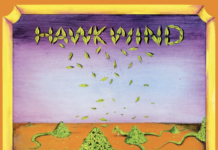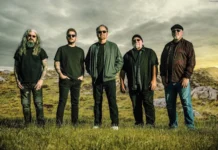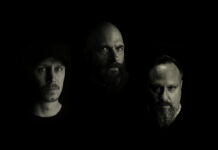‘Behind The Smoke’ begins singularly with Steve Hackett’s voice, a call to prayer as the music begins to encapsulate and Arabian dirge becomes more profoundly classic progressive rock. Halfway through the tempo changes adding an air of mystery and danger, the vocals now are indeed uttered by those from the East, chanting over the sound of drumming, and for the second time during this song a guitar cuts through, soloing loud, melodiously strong and clear.
Steve Hackett’s profile is high. His Genesis-Revisited tours charm old fans, while his most recent albums regularly hit high positions in the rock charts, and the critics seem to like him too – We Brits love an underdog but it has taken a considerable amount of time for them to appreciate what he brought to that most English of prog bands before he decided to jettison himself and go solo. We tend to stereotype Mr Hackett though, pigeonholing him in a style and sound of times gone by. The fact is he does waver, sometimes brilliantly. Going off the beaten track doesn’t always work though, and in seeking to express his concerns about the world we live in on The Night Siren there’s the concern he may have taken a step too far.
One cannot blame the sentiments behind his raison d’être, but the work of the protest song in popular music tends to become twee and over preachy. For the most part such cultural and environmental topics are wrapped in lyrical poetry so obscured more by metaphor. However, you don’t buy a Steve Hackett album to hear him sing and he does rather a lot of that here. When he sings in harmony with others however it turns charming and draws one’s attention to what is being sung all the more clearly. ‘Martian Sea’ is oddly breezy acoustic guitars with flavoured harmonies that recall nothing less than The Doobie Brothers around the time of What Were Once Vices Are Now Habits, only for a strangulated guitar solo to arrive amid more instruments foreign to these ears until the busking drums and undulating bass lead us back to the main song as that too takes on an ominous Gothic structured sound, followed by another guitar solo before it fades. It is one of my favourites.
‘Fifty Miles From The North Pole’ features a John Barry Bond movie type intro soon fades before atmospheric effects and old school Genesis style melodies. It is long and melodramatic, with the approximation of a children’s choir between apocalyptic noises and a hard-hitting guitar playing over a military beat. However, it does not grab my attention. When ‘El Nino’ opens with Jeff Wayne War Of the Worlds style orchestrations I fear the same will hold true but the screaming guitar expressing the raw power of nature’s elements works well on this instrumental. The tranquil acoustic ‘Other Side Of the Wall’ with its world weary vocals of a forbidden love grows with repeated listening while ‘Anything But Love’ is another instant favourite. From acoustic flamenco playing to its upbeat pop-friendly AOR harmonies, it offers a far more robust tune. Then a more expressive style is taken once the guitar soloing emerges with harmonies rejoining on what turns something of a homage to Cream’s version of Skip James ‘I’m So Glad’ with a cracking harmonica solo thrown in from Hackett.
Similarly enjoyable harmonies can be found later on ‘West To East’ where Kobi Farhi and Mira Awad sing over arpeggios not too far removed from Genesis’ ‘Afterglow’. There’s more of a Crosby, Stills & Nash feel as Nad Sylvan and Amanda Lehmann join Hackett on ‘Ince Terra’, it becoming ever more intricate over a Peruvian melody with bongos and drums leading into a melodic progressive rock ride where again Hackett’s guitar bites hard, with what sounds like a talk box thrown in for good measure.
‘In The Skeleton Gallery’ features some heavy guitar and bass going through the changes on this recollection of night time fears by Hackett, with some particularly scary wailing saxophone playing by Rob Townsend, while the Celtic-tinged ‘In Another Life’ moves from acoustic to upbeat rockier guitars but it’s the haunting sound of Troy Donockley’s Uillean pipes that keeps your attention. The album itself finishes with co-writer and keyboard player Roger King accompanying Hackett through the brief but wonderfully sublime ‘The Gift’ an instrumental of the kind one presumed Jeff Beck had made his own, but is far from a pastiche.
This is not an immediately likeable album as far as I am concerned. Songs need to heard, their nuances felt, and preferences acknowledged. Regardless, as a guitarist it cannot be denied that Steve Hackett continues to craft thoughtful refrains that are often inspired, seamlessly expressed and excellent played throughout this album.


















